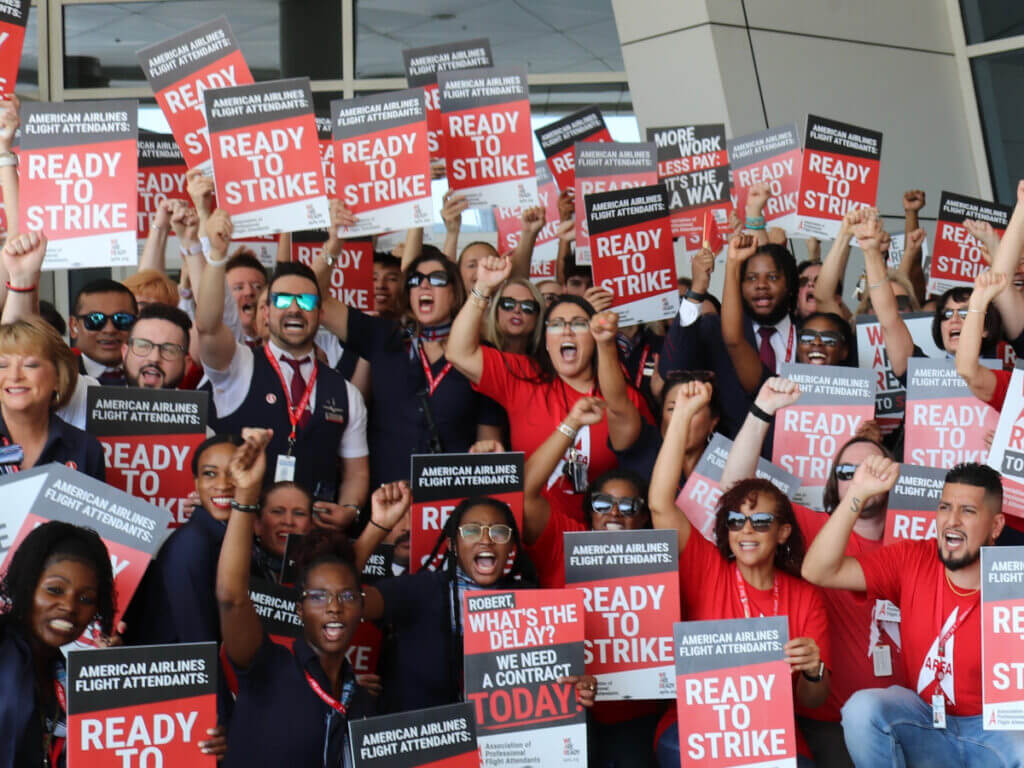Market Overview
What to do when everyone around you is on strike, but you’re not
It doesn’t look like regular readers of this column are going on strike anytime soon. But that doesn’t mean they won’t lose work.
As of our publication date, American Airlines flight attendants are in a mandatory cooling-off period that will keep them in the aisles through the holiday season. United Airlines and Alaska Air flight attendants are also poised for a work stoppage. Southwest Airlines is rumored to be close to a deal with its pilots, but nothing is certain. If any of their unions should declare a labor action, planes will be grounded. The impact could be felt at every gate at every major airport.
So just because you won’t be walking the picket line yourself, that doesn’t mean your income stream can’t be disrupted. You just won’t be able to tap your union’s strike fund. What else, then, can you do to sustain yourself during work hours lost which you didn’t intentionally lose?
It’s more or less the same advice you’d get from your union if you had gone on strike.

A common scene these days in front of DFW. Credit: APFA
Prepare yourself
Take stock of those bills you have to pay regardless of your circumstances. Check your credit rating and clear up any misinformation that might be having an adverse effect. If you’re going to take out a loan or line of credit, now’s the time to do it – before you have to. Same goes for opening a new credit card account or requesting a higher spending limit on a current one.
Unsubscribe
The biggest hole in most of our wallets is subscriptions. Take a look at all those automated payments coming out of your checking account. How often do you really watch that channel? Do you really listen to that many audiobooks? How many news feeds do you really need?
Even before the world went online, though, people subscribed to print magazines, gym memberships and other monthly splurges. Sometimes, the only reason we never got around to canceling them is that they’re tiny leaks and, even in aggregate, didn’t materially affect our lives. Now might be a good time to take a hard look at those non-critical expenses.
Accept your situation graciously
If you pay off your credit card bills at the end of every month, great. That’s always the best policy. But don’t beat yourself up if you can only make the minimum payment for a month or two.
Likewise, there’s no shame in collecting unemployment insurance or other social safety net benefits. This is exactly what they’re there for, and you’ve been paying into these funds your whole working life.
Do it yourself
We’re not telling you to perform your own major household repairs if you’re not qualified. The emergency rooms are filled with people who found out the hard way they’re not roofers. Or welders. Or electricians.
If you really can do these things, great, but that’s not where we’re going with this. We’re really talking about cooking and cleaning. Even with the recent spate of grocery inflation, it’s still much cheaper to eat at home than to go out – not to mention far healthier.
Professional house cleaners are well worth the cost, at least during good times. But maybe this isn’t the kind of luxury you want to dip into savings to maintain.
Work your gig
Pilots have had side ventures long before they were cool. (Side ventures, that is. Pilots were always cool.) A work stoppage or slowdown is the perfect opportunity to grow that business.
Don’t take the poison pill
There’s always a way to get money, but it can get expensive. High-interest credit cards, payday loans and car title loans are collectively called “toxic debt,” and you should avoid it if you can.
The last resort
If all else fails, you can tap your retirement savings. You could probably make the case that you’re making a hardship withdrawal and, as such, not subject to a tax penalty. You might even be able to pay it back within 60 days, call it a wash and not trigger a taxable event. If you can’t pay it back in time, though, your disbursement is taxable as ordinary income. And it’s that much less money you’ll have set aside for your golden years.
Before you crack open your nest egg, think about having a conversation with your financial advisor. If you do need to take this step, you could probably benefit from some guidance as to which accounts to tap and which to leave undisturbed.



